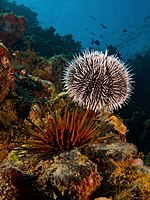
Photo from wikipedia
The 1983 die-off of the long-spined sea urchin Diadema antillarum was linked to dramatic increases in macroalgal biomass and abundance on Caribbean coral reefs. D. antillarum densities have only recently… Click to show full abstract
The 1983 die-off of the long-spined sea urchin Diadema antillarum was linked to dramatic increases in macroalgal biomass and abundance on Caribbean coral reefs. D. antillarum densities have only recently begun to recover, and on some reefs this has led to a decrease in algae and an increase in coral recruits. Given the historic importance of this herbivore and the patchiness of its distribution on modern Caribbean reefs, a better understanding of its feeding preferences for different macroalgae is fundamental to reef ecology and management. This study investigated the feeding preferences of D. antillarum for different macroalgae and benthic cyanobacteria that were most common at our study sites on reefs of the U.S. Virgin Islands, although most of these algae occur throughout the Caribbean. Many of these algae are chemically rich, and some are known to be chemically defended against generalist grazers. Previous studies have suggested that D. antillarum has a greater capacity than herbivorous fishes and other herbivores to consume chemically defended algae. However, in this series of experiments, D. antillarum was more selective than expected in its food choices and avoided eating some macroalgae and cyanobacteria commonly found on shallow reefs of the U.S. Virgin Islands. Types of algae and their chemical extracts that deterred feeding include common brown algae (Dictyota and Lobophora spp.) and cyanobacteria (Dichothrix sp.). These feeding preferences have implications for coral reef ecosystems because some macroalgae and cyanobacteria can have negative effects on the survival of other organisms on reefs, including corals.
Journal Title: Aquatic Ecology
Year Published: 2021
Link to full text (if available)
Share on Social Media: Sign Up to like & get
recommendations!